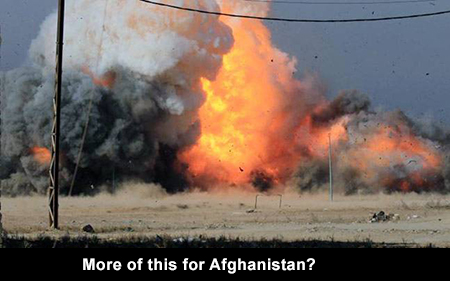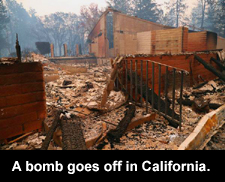As I’ve mentioned more times than I should have, I have had very low expectations for the Biden foreign policy since the beginning. By “the beginning”, I mean well before his election, when you couldn’t find foreign policy positions on his campaign web site for love or money. Biden’s fifty-year track record on foreign affairs is not a particularly good one. I remember him saying he was “ashamed” of Reagan’s “constructive engagement” policy towards apartheid South Africa back in the 1980s. Um …. that’s about it.
These past two weeks have done little to change my mind on this. The drone assassination of Ayman al-Zawahiri, the al Qaeda leader, prompted a lot of fist-pumping on the part of mainstream Democrats and some never-Trump Republicans. A similar amount of jingoism accompanied House Speaker Nancy Pelosi’s visit to Taiwan, as well. I’m not certain what the expected takeaway is for either of these decisions, but it the point was to demonstrate beyond a shadow of a doubt that the current Democratic leadership is well vested into America’s imperial enterprise, they certainly succeeded.
A child of bad policy
Ayman al-Zawahiri was a terrible person, there’s no question. I think, though, as we are the one global super-power, it’s probably a good idea to consider how our policy may have contributed to his no-goodness. Al-Zawahiri started down the road to al Qaeda when he was imprisoned by the Mubarak regime, where he and his fellow prisoners from Egypt’s Muslim Brotherhood were tortured, killed, and otherwise abused. Egypt, I will remind you, has long been a major recipient of U.S. aid, far beyond what nearly every other nation has received from us. If Egypt’s notoriously brutal prison system contributed to al-Zawahiri’s radicalism (which it most certainly did), we bear considerable responsibility for that.
Secondly, there likely wouldn’t have been an al-Qaeda for him to join up with if it hadn’t been for (1) the Afghan CIA operation during the 1980s, and (2) the first gulf war in 1990-91, when U.S. troops were stationed in Saudi Arabia for the first time, remaining there long after Iraq was driven from Kuwait. Again, these were policy choices, not forces of nature. Without multiple interventions in the middle east and southwest Asia, America might not have been such a big, attractive target for these people. Can’t be sure, but …. might have been worth a try.
Worst of the worst?
Then there’s the question of how many lives were lost at the hands of al-Zawahiri. I would argue far too many. As Rachel Maddow pointed out on her show last week, he had a long history of planning terrorist actions, including being one of the masterminds of the September 11 attacks, the bombings in Kenya and Tanzania in 1998, the U.S.S. Cole in 2000, and so on. So, thousands of live lost. Not a nice person, right?
Now, there should be some reckoning as to how that record stacks up to the record of his pursuers. All killing is intrinsically bad, so I’m not suggesting that the rapacious policies of the United States somehow lessen the severity and the cravenness of al-Zawahiri’s attacks. But if it’s bad when he does it, then it’s bad when others do it as well, right? And if others do a lot more killing than he did, well … that makes them particularly bad, right?
Let’s just stick to the wars that followed 9/11. How many people died as a result of our actions? Was it less or more than the number of al-Zawahiri’s victims? In all honesty, America’s victims through this period run in the high six-figures to perhaps seven figures. Several countries were destroyed essentially beyond recovery. Fist pump, anyone?
Unfair comparisons
Okay, I know …. it’s really not fair to compare nation states like the U.S. to non-state actors like al Qaeda or individuals like al-Zawahiri. Nation states have international obligations, responsibilities, and should at least formally be accountable to their populations. Terror networks are kind of a law unto themselves, though international law does bear on them. But honestly …. shouldn’t we expect more out of our own government then that they should be responsible for hundreds or even thousands of times the number of deaths caused by our most ruthless enemies?
Seems like kind of a low bar.
luv u,
jp



 Thousand Oaks, California – located in one of the wild fire zones – had to deal with three national policy failures in the same week. One was the lack of national gun control legislation and strong enough restrictions on gun ownership at the state level. The second was foreign policy – the shooter was a veteran of the Afghan war, though it’s not entirely clear that this was a factor (he had mental issues before going into the service). Then, of course, Thousand Oak residents had barely begun to grieve for their lost loved ones when these fires descended on them. Just an astonishing confluence of hardships, all representing the abject failure of our government to take meaningful steps on any of these issues.
Thousand Oaks, California – located in one of the wild fire zones – had to deal with three national policy failures in the same week. One was the lack of national gun control legislation and strong enough restrictions on gun ownership at the state level. The second was foreign policy – the shooter was a veteran of the Afghan war, though it’s not entirely clear that this was a factor (he had mental issues before going into the service). Then, of course, Thousand Oak residents had barely begun to grieve for their lost loved ones when these fires descended on them. Just an astonishing confluence of hardships, all representing the abject failure of our government to take meaningful steps on any of these issues.